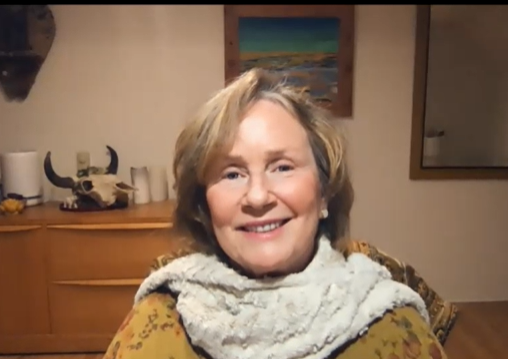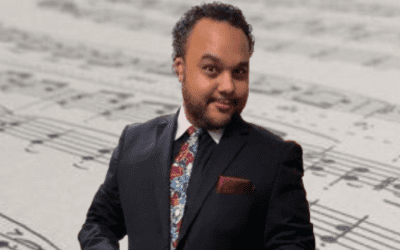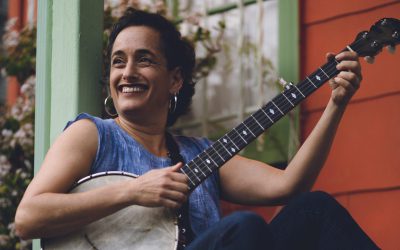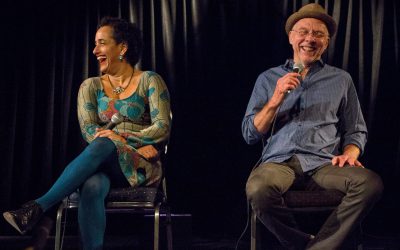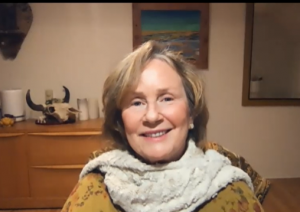
Vocalist, Mary Ford.
The power of singing gospel music helped lifetime vocalist, Mary Ford re-set her life priorities into the arts after a near-fatal accident. Mary shares her story about the transformative power of sound and shares a psychologist’s perspective about the power of sound–for the benefit children and adults in this interview.
The Harmony of Singing the Gospel Together
When people sing together in harmony, despite their different faiths, backgrounds, political viewpoints and more, it’s a powerful thing. Creating together in sound is the power of singing to overwhelm (in a good way) and it helps unify them while they use their voices. The gospel has been sung this way for hundreds of years.
About Mary Ford
Mary Ford has been a vocal performer for 45 years. She has sung a capella, as an accompanied soloist and most recently has been a member of the The Left Coast Sextet, an all women’s jazz ensemble. She’s sung for 34 years with the Oakland Interfaith Gospel Choir.
Retired psychologist, mother, spouse, and bodyworker, as well as an active artist, Mary is also a writer and an adventurer. She works with several local nonprofits as an advisor, teacher and donor activist, and is dead serious about economic and racial justice. Mary is a boogie boarder and rabidly competitive pickleball player.
To listen to this episode as a podcast, search for Agile Vocalist wherever you get your podcasts.

- Mary’s beginnings as a singer
- How she joined Oakland Interfaith Gospel Choir, a life change after a near-fatal accident
- Manifesting love, joy, and unity as a choir member
- Singing to embody being a messenger and as a means to serve others
- A place for sound (and of course, Quiet Time); Cazadero Performing Arts Family Camp (how I met Mary)
- How the arts give back our childhoods
- Mary performs a Cherokee proverb for you!

Mary Ford with Rachel Medanic, virtually.
In this episode:
Mary’s longtime choir, Oakland Interfaith Gospel Choir
Oakland Interfaith Gospel Choir Holiday 2020 Concert
One Voice: The Story of Oakland Interfaith Gospel Choir (2018)
The New Science of Singing Together, Greater Good Science Center
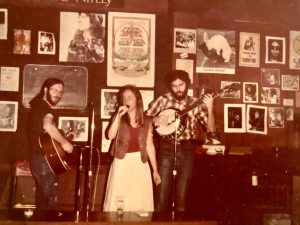
Mary singing in cafes early in her career.
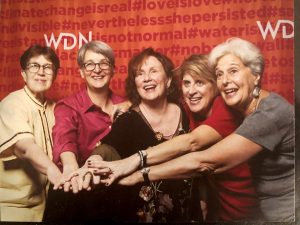
Mary and the band members of the Left Coast Sextet.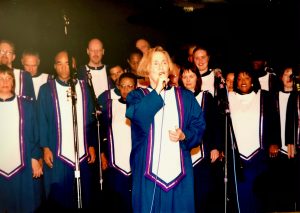
Mary sings with the Oakland Interfaith Gospel Choir.
Did you enjoy this episode? We hope so! Subscribe to hear future interviews not just with singers, but also with sound makers and the powerful ways sound touches life.
Episode Transcript:
[Spoken intro: “Listen to this next Agile Vocalist blogcast” + music]
Spoken introduction: Mary Ford has been a vocal performer for 45 years. Her work has been a cappella, as an accompanied soloist, and most recently as a member of the Left Coast Sextet, an all women’s jazz ensemble. She’s sung for 34 years with Oakland Interfaith Gospel Choir. Mary’s a mother spouse, retired psychologist, and body worker as well as an active artist writer and adventurer. She works with several local nonprofits as an advisor teacher and donor activist and she’s dead serious about economic and racial justice. Mary is a boogie border and rapidly competitive about pickleball.
Rachel: I’d love for the folks listening and watching: tell us about how you got your roots and singing, how you found out you loved it, and your love of sound and performance.
Mary: I’ve been singing my whole life. I sang songs in camp and then I would go home and I would sing; I would sing in the car. I drove my family insane because I sang all the time. They couldn’t stop me. We would go on trips and I would be singing and singing.
Mary: I went to Catholic school; Mary Catherine Ford is my name. Got Catholic? I heard Up With People and I was utterly thrilled. I was so thrilled to see all these people up there being so happy and friendly. I still know those songs just from that one show they did in the high school auditorium when I was in elementary school.
That’s how I started and then in second grade, Sister Pious realized that I could sing and she had me sing the Balulalow at the Christmas concert. I was terrified and warbled through it and then the rest is history. I sang in glee club, and I went to national Cathedral school and I sang in the madrigals there. I went to college and I sang in cafés and found out about Joni Mitchell. I learned dulcimer and I sang songs. I moved to California when I was 19 and sang in a coffee houses and on the street. I sang anywhere I could sing, and somebody noticed me and put me into a band and taught me how to sing jazz and then I was in a Bluegrass band.
Rachel: What a lot of people may not know is that there’s been an extensive research done that singing makes you happier. It helps stabilize mental health. It helps you maintain a level of balance and or improve. There’s even been some research that I’ll link to in the liner notes that shows that music are involved in service to group living and that it’s innately connected to basic human social drives.
I’d love for you to talk a little bit about with your background as a psychologist: how you’ve seen that come to fruition with people you’ve worked with over the years, both for yourself but anyone you worked with. How did music affect them or what what it what did you observe in terms of the human animal, the human psychological animal?
Mary: One of the things I love is everyone knows singing is wonderful for you, but now we have proof. Yay! It acts as a bellows on your ribs in a way where you are pumping your lymphatic system. You’re increasing your lymphatic flow as well as air flow.You’re moving your body in a way that you can’t fully control–which [laughs] seems to be the goal of most things these days [laughs]. This ends up being the antidote to a lot of that. You can learn about music and learn music theory, you can learn songs, etc., but the bottom line is that you learn all this stuff and then when you’re really singing, you’re letting go.
Because if you were really singing hard you’re trying to control your throat and your jaw and so forth and you are not going to get your spirit out in it in the same way if you’re trying to control it. It’s getting all prepared and then it’s actually having to let go like so many other things in life.
[Audio page turn and Agile Vocalist jazz sounds transition]
Rachel: So, let’s lead with that into the Oakland Interfaith Gospel Choir which, for short acronym purposes is OIGC, in case I say that. Your journey started over 30 years ago, tell us a little bit about that.
Mary: I’ll make a long story short and say: I got married in 1988 and I was in a shipwreck on my honeymoon. And a lot of things changed after that because we almost died. Seriously.
Rachel: Wow! Oh!
Mary: I was kind of wandering around in a daze and I had a year and a half of surgeries and all kinds of things that happened to me. And one of the things that happened was Jesse Jackson was running for president and I went to a fundraiser and I heard the Oakland interfaith choir ensemble. And I went that is what I want to do.
[Audio: Oakland Interfaith Gospel Choir singing, multiple voices: Oh Lord, Hear my Prayer]
Mary: Took me about 4 or 5 years to try out as a soloist. Then I became a soloist after that. About 8 years in I started being into leadership and on the board. We traveled to Israel and Australia and a lot of places. And we get to sing together. And I’m with people who I might not know in other ways: there is every faith, every color, every sexual orientation, every economic background or status–and lots of other things I know and don’t know about people. And we all sing. And that’s the main thing we do together. And we embody that when we sing. We sing really well (I said…humbly) but we manifest on stage with what we’re doing; with the love that we feel and the joy that we feel when we’re honoring black Baptist Gospel music. Not only black Baptist and spirituals.
Rachel: Nice. It sounds like being with these people, in particular that you’ve rehearsed with, that you are ultimately performing what gets you really excited. Is music a sensual experience for you and what do you do to get pumped up before concert, besides show up?
[Mary singing lead with a group: Mercy on Me]
Mary: It’s a spiritual thing for sure. He certainly the choir reinforces that—big time. But I have sung for years singing a capella. I love a capella as well. I sang at a lot of women’s conferences over the years. It’s very meaningful to me to be doing that. It releases me and when I’m at my best with it, that’s how I actually try and prepare myself.
I had one teacher Molly Holmes, a lot of you would know her, she helped me a lot when I am preparing. I actually don’t need help pumping up; I need help “un-pumping up,” and calming down. And not getting into that mmmm [buzzy sound] place about about it. She was very good about reminding me. (We do it in the choir; we always do a circle before we sing. We have sort of a chant we do together about bringing love). And what Molly always was talking about is big long breaths in, big breaths out, long ones. Keep doing that, keep doing it, keep doing that, don’t be coughing. You swallow if you need to.
The other part to remember is: it’s not about you.
Rachel: Oh! Talk more about that.
For me it’s that I am a vessel at some point, I’m a messenger. I feel that way. I don’t want it to seem like it’s just a trick, but really when I’m doing it, I do feel like a servant–in a cool way. I’m bringing something into the world. I’m a midwife or something like that I’m bringing something and in the process of it I’m transforming myself. I’ve sung for thousands of people at a time and that is just wow…a huge thing. And it’s not just like, “Wow, yeah, now they know ‘how good I am,’ it’s ‘Oh my goodness, we have just gone into this place together and I feel it.’ And when that happens, I am incredibly vulnerable (and I’m very prepared too) so what when I’m taken over by that, my body knows how to go ahead and sing and produce so that I can let spirit take me.
Rachel: Mary and I met through an organization called Cazadero Performing Arts Family Camp (Caz). In this segment, we talk about sounds at camp, or lack thereof.
How does Caz and getting away for a week to Caz, and not having Wi-Fi, and not being able to be electronically connected…
Mary: And… having a nap period. Where no one in the camp is allowed to talk outside.
Rachel: Oh yes, the quiet period.
Mary: That is a big deal. I mean none of us like to do it, but you better do it because if you don’t, you are going to get talked to. That is magic and not just for those kids, believe me. I started taking naps when I’ve never had naps before. It is quiet and I wasn’t allowed to blah blah. It’s an amazing community of people.
Rachel: Yeah, so for people who don’t know: there’s two classes in the morning there’s lunch can you get breakfast so you can get a breakfast anytime. You have lunch then you have quiet time and then there is free time. And that’s followed by free time. And then you finish the day with two more classes and then at night there’s a variety of activities and dances and performances and shows.
Mary: And during free time, there’s actually an open mic you can go to. And if you’re just working on something you can go up and play a piece of it, or not. Or, you and somebody else say, hey, “let’s do that song,” and go and do that. It’s a beautifully supportive situation where people know each other and, I joke about it but “dare to suck” is one of the mottos we have. It’s like go ahead, just do it. Everybody’s going to love you. It’s a great time to be doing that and to get over performance fears.
Rachel: What do the arts, what does Caz, what does singing, what does sound do for adults?
Mary: It can feel very intimidating if haven’t done it before. It gives you back your childhood. It gives you back childhood in the present. If you can get over that hump of, “oh my goodness, I’m at the bottom of the ladder again,” which, it’s hard to do. It’s hard to have a new job that way too, or a new profession. It’s the same with music. Cause music, Oh boy, it can be really humbling. I mean you can sing and sing any old time, but if you’re doing music [uncertainty sound] it can feel intimidating.
Oh my gosh, I mean singing–thank god there are a lot supportive singing shows now where people are nice. The amount of humiliation so many people feel about about singing ahh, it’s just such a sin that that happened. I’m going off topic a little bit there for a minute.
For adults, it means you can let go. You know: lose that identity, lose the thing that you got to do in the next hour, lose lose thinking you know what needs to happen next.
One of the things that happened at Cazadero, after I was there a few years, I became more and more comfortable and felt safer and safer; I ended up doing this 15 second skit with this person. This is me, dressed as Opera Lady. She’s holding up her brassiere right there, the pointy brassiere thing. She had a swan with her most of the time as well.
Rachel: Oh wow!
Mary: (A plastic swan of course). She was iconic and she was very meaningful because there was a huge build up for her to come on stage and sing, and then she never actually ever sang. She was on stage 8 years in a row, and then something would happen. And it had to do with, it was unconscious at first, but basically had to do with my own anxieties about performing. All this would happen then all of a sudden and I run off stage.
She was in prison for a while, and then she was in rehab, and she tried to adopt some kids, a la some people we know. I trained one of the kids a Caz to [pretend as part of the skit] to come up to me to be adopted and she kicked me in the shin and said, “No way!!” It was crazy, fun stuff. So anyway, I was terrified every year that I had to do this and then I would write for four hours during Caz, and then then I would do this skit on the evening that’s called the UnTalent show. You’re supposed to do something that you’re not good at it.
Rachel: Right but it has to be unusual, unprecedented, but never unrehearsed.
Mary: I think I will sing something that is often attributed as a Cherokee saying. And sometimes I can see Indian proverb or, Native American. And it’s something I’ve sung on and off since I was in my 20s and it means something to me.
Mary: [Breathing] Here’s the breath.
Mary Sings: When you were born you cried, and the world rejoiced. Live your life so that when you die the world cries and you rejoice.
When you were born you cried, and the world rejoiced. Live your life so that when you die the world cries and you rejoice.
Rachel: Yay. This is how I do applause in the Zoom era. Yay. I love the Zoom era, your applause is in the email. [laughter] Thank you. [laughter]
[Spoken outro: “That was inspiring. Be sure to listen again soon + music]

